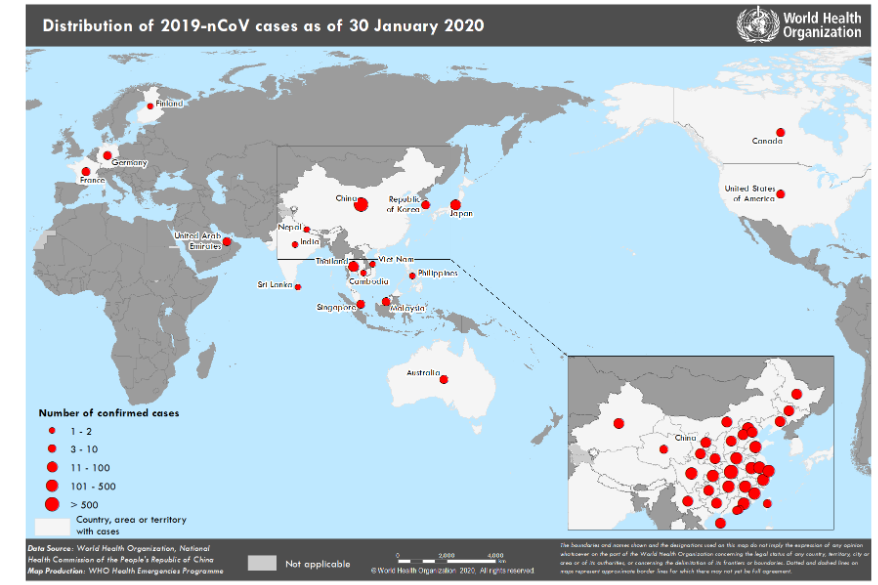
Credit: Wikipedia
Tedros Adhanom Ghebreyesus, World Health Organisation’s director-general has declared Wuhan Novel Coronavirus Outbreak Public Health Emergency of International Concern.
Coronavirus has spread to all regions of China and confirmed number of cases have crossed 7800. According to WHO, there have been 82 cases in 18 counties outside of China.
WHO has recommended that the interim name of the disease causing the current outbreak should be “2019-nCoV acute respiratory disease” (where ‘n’ is for novel and ‘CoV’ is for coronavirus).
The person-to-person spread of the new coronavirus were reported in four countries — Germany, Vietnam, Japan and United States.
Several countries including Canada are evacuating their citizens from Wuhan, China.
In Canada, there are 3 confirmed cases with two in Ontario and one in British Columbia.
In Ontario, 27 cases are under investigation for 2019 novel coronavirus.
Status Across the World as of January 30, 2020
- Globally — 7818 confirmed cases
- China — 7736 confirmed cases, 12167 suspected cases, 1370 severe cases, and 170deaths
- Outside of China — 82 confirmed cases in 18 countries
- First confirmed cases of 2019-nCoV acute respiratory disease in Finland, India and Philippines; all had travel history to Wuhan City.
About Public Health Emergency of International Concern (PHEIC)
A PHEIC is defined in the IHR (2005) as, “an extraordinary event which is determined to constitute a public health risk to other States through the international spread of disease and to potentially require a coordinated international response”. This definition implies a situation that is:
serious, sudden, unusual or unexpected;
carries implications for public health beyond the affected State’s national border; and
may require immediate international action.
Other than today’s declaration, there have been five PHEIC declarations:
- The 2009 H1N1 (or swine flu) pandemic
- The 2014 polio declaration
- The 2014 outbreak of Ebola in Western Africa
- The 2015–16 Zika virus epidemic
- The Kivu Ebola epidemic which began in 2018.
Once Public Health Emergency of International Concern is declared, the Emergency Committee will be reconvened within three months or earlier, at the discretion of the Director-General to review the situation.
About Wuhan Novel Coronavirus
WHO was alerted to several cases of pneumonia in Wuhan City, Hubei Province of China on 31 December 2019. One week later, on 7 January, Chinese authorities confirmed that they had identified a new virus – coronavirus, which is a family of viruses that include the common cold, and viruses such as SARS and MERS. This new virus was temporarily named “2019-nCoV.
Coronaviruses are a large family of viruses. They can cause diseases ranging from the common cold to more severe diseases such as Severe Acute Respiratory Syndrome (SARS).






